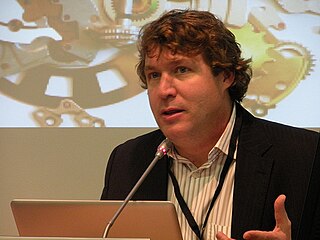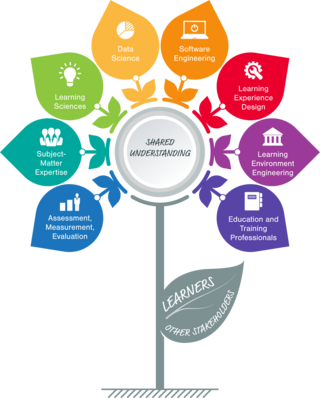
The Global Learning and Observations to Benefit the Environment (GLOBE) Program is a worldwide hands-on, science and education program focusing on the environment, now active in over 125 countries worldwide. It works to promote the teaching and learning of science, enhance environmental literacy and stewardship, and promote scientific discovery. Students, educators, and members of the public collect data and perform research in collaboration with scientists from many international agencies, and their work is made accessible through the GLOBE website.

The Human–Computer Interaction Institute (HCII) is a department within the School of Computer Science at Carnegie Mellon University (CMU) in Pittsburgh, Pennsylvania. It is considered one of the leading centers of human–computer interaction research, and was named one of the top ten most innovative schools in information technology by Computer World in 2008. For the past three decades, the institute has been the predominant publishing force at leading HCI venues, most notably ACM CHI, where it regularly contributes more than 10% of the papers. Research at the institute aims to understand and create technology that harmonizes with and improves human capabilities by integrating aspects of computer science, design, social science, and learning science.
Project LISTEN was a 25-year research project at Carnegie Mellon University to improve children's reading skills. Project LISTEN. The project created a computer-based Reading Tutor that listens to a child reading aloud, corrects errors, helps when the child is stuck or encounters a hard word, provides hints, assesses progress, and presents more advanced text when the child is ready. The Reading Tutor has been used daily by hundreds of children in field tests at schools in the United States, Canada, Ghana, and India. Thousands of hours of usage logged at multiple levels of detail, including millions of words read aloud, have been stored in a database that has been mined to improve the Tutor's interactions with students. An extensive list of publications can be found at Carnegie Mellon University.

George Siemens is a Canadian expatriate professor of psychology at the University of Texas at Arlington and professor and director of the Centre for Change and Complexity in Learning at the University of South Australia. He is known for his theory of connectivism, which seeks to understand learning in the digital age. He played a role in the early development of massive online open courses (MOOCs).

Jaime Guillermo Carbonell was a computer scientist who made seminal contributions to the development of natural language processing tools and technologies. His extensive research in machine translation resulted in the development of several state-of-the-art language translation and artificial intelligence systems. He earned his B.S. degrees in Physics and in Mathematics from MIT in 1975 and did his Ph.D. under Dr. Roger Schank at Yale University in 1979. He joined Carnegie Mellon University as an assistant professor of computer science in 1979 and lived in Pittsburgh from then. He was affiliated with the Language Technologies Institute, Computer Science Department, Machine Learning Department, and Computational Biology Department at Carnegie Mellon.

The Pacific National University (PNU) is a public university in Khabarovsk, Russia, established in 1958. PNU has over 12,000 students in 80 various academic majors.
Reasoning Mind is a non-profit organization that develops computer-based math curricula and works with schools to implement them in classrooms. In addition, Reasoning Mind provides professional development to teachers using the program. The organization works closely with partner schools to help them achieve a successful implementation. Reasoning Mind uses Instruction Modeling and the Baker Rodrigo Ocumpaugh Monitoring Protocol as core components of its research and development process.

David Klahr is an American psychologist whose research ranges across the fields of cognitive development, psychology of science, and educational psychology and has been a professor at Carnegie Mellon University since 1969. He is the Walter van Dyke Bingham Professor of Cognitive Development and Education Sciences at Carnegie Mellon University and a member of the National Academy of Education, a Fellow of the American Psychological Association, a Charter Fellow of the Association for Psychological Science, on the Governing Board of the Cognitive Development Society, a member of the Society for Research in Child Development, and the Cognitive Science Society. He was an associate editor of Developmental Psychology and has served on the editorial boards of several cognitive science journals, as well as on the National Science Foundation's subcommittee on Memory and Cognitive Processes, and the National Institutes of Health's Human Development and Aging Study Section.
Learning analytics is the measurement, collection, analysis and reporting of data about learners and their contexts, for purposes of understanding and optimizing learning and the environments in which it occurs. The growth of online learning since the 1990s, particularly in higher education, has contributed to the advancement of Learning Analytics as student data can be captured and made available for analysis. When learners use an LMS, social media, or similar online tools, their clicks, navigation patterns, time on task, social networks, information flow, and concept development through discussions can be tracked. The rapid development of massive open online courses (MOOCs) offers additional data for researchers to evaluate teaching and learning in online environments.
Educational data mining (EDM) is a research field concerned with the application of data mining, machine learning and statistics to information generated from educational settings. At a high level, the field seeks to develop and improve methods for exploring this data, which often has multiple levels of meaningful hierarchy, in order to discover new insights about how people learn in the context of such settings. In doing so, EDM has contributed to theories of learning investigated by researchers in educational psychology and the learning sciences. The field is closely tied to that of learning analytics, and the two have been compared and contrasted.
The Tepper School of Business is the business school of Carnegie Mellon University. It is located in the university's 140-acre (0.57 km2) campus in Pittsburgh, Pennsylvania.
Albert T. Corbett is an associate research professor emeritus of human–computer interaction at Carnegie Mellon University. He is widely known for his role in the development of the Cognitive Tutor software, leading to one article with over 1,000 citations. Along with John Robert Anderson, he developed the Bayesian knowledge tracing algorithm, which is used in Cognitive Tutor software. This work has been particularly influential in the educational data mining community—over half of the EDM conference papers published in 2011 and 2012 cited Bayesian knowledge-tracing. Corbett studied psychology at Brown University, and obtained a doctorate in psychology from the University of Oregon. His doctoral advisor was Wayne Wickelgren.
The Pittsburgh Science of Learning Center is a Science of Learning Center funded by the National Science Foundation and managed by Carnegie Mellon University and the University of Pittsburgh. The PSLC is led by Kenneth Koedinger and Charles Perfetti, and includes many other notable scientists, including Vincent Aleven and David Klahr.
Vincent Aleven is a professor of human-computer interaction and director of the undergraduate program at Carnegie Mellon University's Human–Computer Interaction Institute.

Jason H. Moore is a translational bioinformatics scientist, biomedical informatician, and human geneticist, the Edward Rose Professor of Informatics and Director of the Institute for Biomedical Informatics at the Perelman School of Medicine at the University of Pennsylvania, where he is also Senior Associate Dean for Informatics and Director of the Division of Informatics in the Department of Biostatistics, Epidemiology, and Informatics.
Rayid Ghani is a Distinguished Career Professor in the Machine Learning Department and the Heinz College of Information Systems and Public Policy at Carnegie Mellon University. Previously, he was the director of the Center for Data Science and Public Policy, research associate professor in the department of computer science, and a senior fellow at the Harris School of Public Policy at the University of Chicago. He was also the co-founder of Edgeflip, an analytics startup that grew out of the Obama 2012 Campaign, focused on social media products for non-profits, advocacy groups, and charities. Recently, it was announced that he will be leaving the University of Chicago and joining Carnegie Mellon University's School of Computer Science and Heinz College of Information Systems and Public Policy.
The Baker Rodrigo Ocumpaugh Monitoring Protocol (BROMP) is a momentary time-sampling method for quantitative field observations such as those used in classroom observation. BROMP was originally developed by Ryan S. Baker to study student engagement in online learning. Afterwards, it was adapted for use in the Philippines by Ma. Mercedes Rodrigo, and to study student emotion. It was systematized by Jaclyn Ocumpaugh in two coding manuals, the first in 2012, and the second in 2015. It was adapted for use in India by Chokanath Hymavathy and Viola Krishnamani. It has also been adapted for use in informal science education settings. Since its development, BROMP has been used in over 50 published scientific articles, by researchers at several universities.

Dragan Gašević is Professor of Learning Analytics at Monash University. He is a researcher in learning analytics and co-developed several software systems such as P3, rBPMN Editor, LOCO-Analyst, OnTask, OVAL, and ProSolo. He is recognized as Australia's field leader in educational technologies.

Bruce Martin McLaren is an American researcher, scientist and author. He is a professor at Carnegie Mellon University in the Human-Computer Interaction Institute, head of the McLearn Lab, and a former President of the International Artificial Intelligence in Education Society (2017-2019).

Learning Engineering is the systematic application of evidence-based principles and methods from educational technology and the learning sciences to create engaging and effective learning experiences, support the difficulties and challenges of learners as they learn, and come to better understand learners and learning. It emphasizes the use of a human-centered design approach in conjunction with analyses of rich data sets to iteratively develop and improve those designs to address specific learning needs, opportunities, and problems, often with the help of technology. Working with subject-matter and other experts, the Learning Engineer deftly combines knowledge, tools, and techniques from a variety of technical, pedagogical, empirical, and design-based disciplines to create effective and engaging learning experiences and environments and to evaluate the resulting outcomes. While doing so, the Learning Engineer strives to generate processes and theories that afford generalization of best practices, along with new tools and infrastructures that empower others to create their own learning designs based on those best practices.










